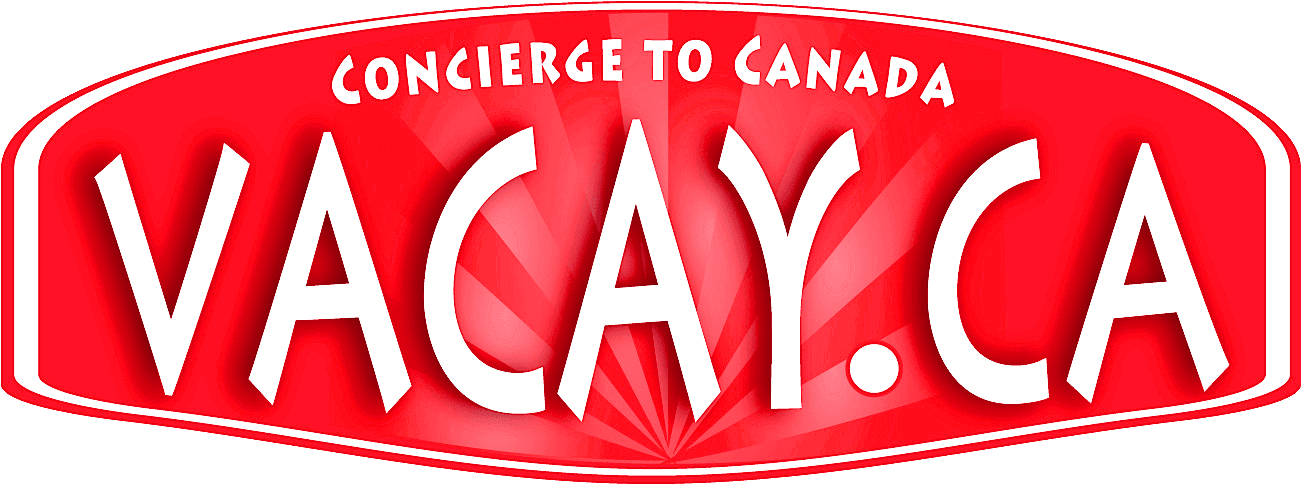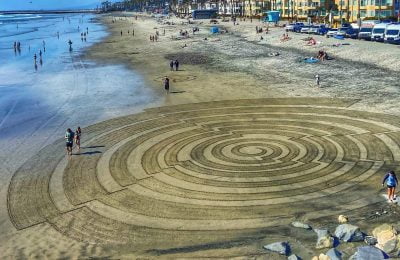Story by Adrian Brijbassi
Vacay.ca Managing Editor

The Rugged Beauty tour departs from New Bonaventure, one of the communities along Trinity Bay in the Bonavista Peninsula. (Julia Pelish/Vacay.ca)
NEW BONAVENTURE, NEWFOUNDLAND & LABRADOR — Meet Bruce Miller.
He lives here, in the land of his father and grandfather, a remote swath of territory with enough arable acreage, clean air, pristine water, and wildlife to inspire poetry and instill a will to depart only upon a last breath. A thoughtful Canadian, Miller flies the flag of Newfoundland outside his home, a small cabin overlooking British Harbour and Trinity Bay at the edge of the continent. In an island of Baymen and Townies, Miller is Bayman to the core, with a lilt in his brogue and a ready wink to go with his easy smile. He makes a meagre living as a fisherman and labourer and augments his income operating one of the most unique and riveting tours in Canada, taking visitors to communities affected by Newfoundland’s controversial resettlement. The itinerary includes a stop in his own home, for a cup of tea.
“It’s the history that people seem to love,” Miller says on a wet day in September. He flips through picture books that show boats from a half-century ago trawling homes in a mass exodus that you would think only happens because of disaster or a plague. Among the photographs are some of Miller’s parents, who chose not to follow.
“This is home. You can’t replace that. The government can’t replace that,” he says. “These days, it’s becoming harder and harder to stay. You have to be real creative to make a living here.”
It’s no surprise Miller cherishes living in the Bonavista Peninsula. What a visitor might find bewildering is why anyone would urge people to leave Trinity Bay and the communities dotting it. But that’s what the Canadian government did over the course of 21 years, “resettling” Newfoundland from 1954-75, convincing more than 30,000 people who knew only of life with the land and the sea that the future was urban, in growing centres close to the Trans-Canada Highway and the goods shipped in by the big trucks that use it.
The resettlement of outpost Newfoundland emptied villages along the coast of Trinity Bay and elsewhere on the island that thrived on fishing and the lumber trade. Boats tugged houses across the waters, relocating them and their possessions — family heirlooms, old photographs, handmade furniture and the fishing gear that sustained life — to new locations miles away. The government compensated those Newfoundlanders who moved, but some refused the money and the lure of city life. Miller’s Rugged Beauty tour ferries visitors to communities affected by the resettlement.
Along the way, you get to glimpse the landscape that’s proved a magnet for Miller. His fishing boat passes alongside fjords that catch your ear with a gentle sound, nature’s form of a symphony applause when waterfalls plummet down craggy cliffs, over green stumps and jagged trunks. Eagles flap overhead as Miller steers close to the “Random Passage” movie site, which features buildings used in the filming of the 2002 mini-series. “Random Passage” is a fictitious story that chronicles life in outport Newfoundland when it was still a British colony. Its popularity has helped bring tourism into New Bonaventure, which needs any source of income it can get.
Why Newfoundland’s Cod Moratorium is Bizarre
In 1992, the Canadian government did what was unthinkable in Newfoundland and Labrador. It banned cod fishing, saying the species had been so depleted that 20,000 workers in the Newfoundland fishing industry had to be laid off in order for the fish to survive.
“The moratorium on the cod fish, to me, that was the worst thing to happen to Newfoundland,” Miller contends. “Rural Newfoundland was resettled again.”
People who were suddenly out of work moved to cities and adopted new skills. Again, Miller stayed. Now, 20 years later, the cod are back. In one 20-minute flurry, Miller and I caught 15 fish — without using bait. The fish latched on to bits of yellow rubber. As the line sank, the hook would hit the heads of cod on the way to the bottom. I’m as awful a fisherman as you’ll ever meet and even I found fishing in Trinity Bay akin to something like a carnival game at a summer fair. It was about seeing how many you could catch and how fast, not wondering if you would catch any. Each September, the cod moratorium is lifted for two glorious autumn weeks. Summer fishing is also allowed in late July. During those periods, each resident can catch up to five cod each per day, or up to 15 per boat (we had three in our boat, which is why we hauled up 15). After experiencing the bounty of cod in Newfoundland — and the giddiness with which people take to reeling in the fish — I had to wonder why the ban exists at all.
“The cod fish aren’t back, because they never left,” Miller says. “There’s always been fish in Trinity Bay.”

Bruce Miller is happy to be out cod fishing when the moratorium is lifted each July and September. (Julia Pelish/Vacay.ca)
He believes the cod moratorium introduced under the Mulroney government was much too harsh. In the Grand Banks, 280 kilometres off the coast of Newfoundland, European fishing operations continue to hook cod because their nations never imposed a ban and the fish stocks in that area of the province are troublingly low. But in the inland bays, Miller says the fish are thriving. That was clear to me during my four-day stay in Trinity. Earlier this year, scientists and environmentalists agreed that the cod are living longer and reproducing more. But the ban remains and is part of the narrative of the Rugged Beauty boat tour, which gives an honest account of what the Canadian government has done to some of the friendliest people in the nation. It is a tour that will make you angry, even if Miller is not. He is stunningly diplomatic and frank, saying he understands why the government makes some of the decisions it does. His wish is for lawmakers to give more consideration to the people whose lives are shaken by life-altering policies. Imagine if banking was suddenly not allowed to take place on Bay Street in Toronto or if wheat farming was banned in Saskatchewan. The change would be a shock and cause those affected to riot, which is what the cod-fishing moratorium did in Newfoundland.
“For people like my father who only knew fishing, who only lived to fish, the ban tore the heart out of those people,” Miller says. “You take cod fishing away from the people of Newfoundland and you may as well take away their happiness.”
Despite that, Miller stays, watching over British Harbour and Trinity Bay while some of his friends skip off to Alberta to make big money in the oil and gas business. He drinks his tea and tells visitors it’d kill him to go. Miller then recites a lyric from a Simani song about “Outport People” — Baymen like him — and you realize that along with beauty, cod and mist in Trinity Bay, there is an abundance of soul.

When you see the view looking out at Trinity Bay from Bruce Miller’s home in British Harbour, you’ll understand why he wouldn’t want to leave. (Julia Pelish/Vacay.ca)
“Don’t take a man from the life that he knows,
And tear up his roots and expect him to grow;
‘Cause if he’s unwillingly forced to decide,
He’ll move without leaving and never arrive.”
More About Rugged Beauty Boat Tours
Location: The tour lasts three hours and departs at 10 am and 2 pm daily during spring, summer and fall. The boat leaves from the docks at New Bonaventure. (see map below)
Cost: Adults pay $70; children $50. Specialty tours are also available. Contact Bruce Miller for details.
Reservations: To book a tour telephone 709-464-3856 or email bruce@ruggedbeautyboattours.net
Website: www.ruggedbeautyboattours.net
Note: Thanks to reader Deanne Hiscock for pointing out that the summer fishery is also open for three weeks in July, along with the two-week fall fishery in September. A change has been made to the original article.
View Larger Map








4 Comments
William Tracy Mattox
January 5, 2013 at 7:13 am1958 I was eight yrs old and went squid fishing with my grand daddy, John Ivany and first cousin Tracy Ivany. It was a day to be remembered. The other fishing boats made a circle ,lit their lanterns and began to jig squid. The fishermen had their own launguage, and were unique to Newfoundland. I saw history first hand that night. It was the end of cod fishing and a way of life that embraced a freedom of the individual. IT was wrong to snuff those free spirits. Some stayed, but eventually died out. It was a great day to be there watching as history was made.
Vicky
January 6, 2013 at 2:18 amBeautiful comments, Bill. Thanks for sharing them — and feel free to expand on them. We’re eager to learn more about your travel experiences!
Deanne Hiscock
January 17, 2013 at 4:33 pmBeautiful video!! The scenery, history and people of the Bonavista Peninsula is a wonder to behold!! I live in Catalina, approximately 20 km from Bonavista, on the tip of the Peninsula and appreciate waking to the sun rising over the peaceful harbor. A note to add, the cod fishery also opens for two weeks in late July, for recreation fishing. Great treat to catch a fresh cod and cook it, yummy!! Especially the cod tongues!!
Deanne Hiscock
deescrafts@yahoo.com
Vicky
January 21, 2013 at 7:02 amHello Deanne,
Thank you for your comment and for pointing out our omission of the July summer fishery. We have made the change to the article and credited you for alerting us to the discrepancy. Enjoy your beautiful part of the world — and be sure to save some of that cod for the rest of us!
Vicky!